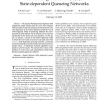Free Online Productivity Tools
i2Speak
i2Symbol
i2OCR
iTex2Img
iWeb2Print
iWeb2Shot
i2Type
iPdf2Split
iPdf2Merge
i2Bopomofo
i2Arabic
i2Style
i2Image
i2PDF
iLatex2Rtf
Sci2ools
EOR
2010
2010
On the system optimum of traffic assignment in M/G/c/c state-dependent queueing networks
-- The classical Wardrop System Optimum (SO) assignment model assumes that the users will cooperate with each other in order to minimize the overall travel costs. The importance of the System Optimum model lies on its well-recognized ability of producing solutions that correspond to the most efficient way of using the scarce resources represented by the street and road capacities. In this paper, we present a version of the System Optimum model in which the travel costs incurred on each path come from M/G/c/c state-dependent queueing networks, a stochastic travel time estimation formula which takes into account congestion effects. A differential evolution algorithm is proposed to solve the model. We motivate this version of the problem in several ways and computational results show that the proposed approach is efficient. Keywords -- System Optimum; traffic assignment; queueing networks; genetic algorithms.
| Added | 10 Dec 2010 |
| Updated | 10 Dec 2010 |
| Type | Journal |
| Year | 2010 |
| Where | EOR |
| Authors | Frederico R. B. Cruz, Tom Van Woensel, James MacGregor Smith, Kris Lieckens |
Comments (0)

